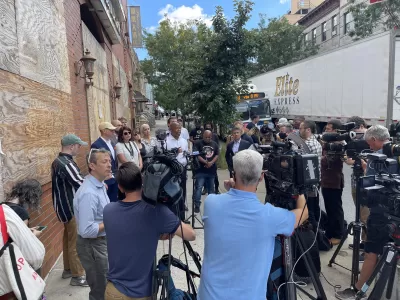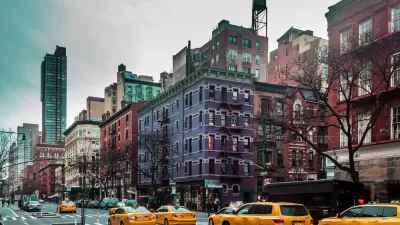Eric Adams, Democratic candidate for New York City mayor, announced a proposal to convert existing hotel rooms to supportive and affordable housing. The plan faces obstacles in statewide building codes and local zoning regulations.

Eric Adams, the Democratic nominee for mayor of New York City, "unveiled a plan that would rehabilitate and convert 25,000 derelict hotel rooms into permanent supportive and affordable housing," reports David Cruz.
The proposal was met with support from housing advocates and elected officials, according to Cruz. "The plan would also fill a need for a reeling hotel industry whose supply of room outnumbers demand, particularly during the pandemic."
According to the article, the proposal faces numerous obstacles to speedy, efficient delivery, namely in the multiple dwelling laws written at the state level, "which mandate the size of apartment units that include bathrooms and kitchens," according to Cruz.
"The city can't circumvent the state's multiple dwelling law—unless the legislature makes changes—which means any nonprofit that seeks to purchase a hotel is required to carve out adequate space for a kitchen. Some of those hotels can be transformed since several were initially built as residential apartment buildings."
Zoning also presents an obstacle. Under the city's current zoning, "hotels in manufacturing districts that are converted to housing must be changed to a residential zone. And those changes would undergo a public review process that could last take six months to a year," explains Cruz.
FULL STORY: Eric Adams' Plan To Create 25,000 Supportive Housing Units Is Doable, But Hurdles Lie Ahead, Say Experts

Alabama: Trump Terminates Settlements for Black Communities Harmed By Raw Sewage
Trump deemed the landmark civil rights agreement “illegal DEI and environmental justice policy.”

Planetizen Federal Action Tracker
A weekly monitor of how Trump’s orders and actions are impacting planners and planning in America.

Why Should We Subsidize Public Transportation?
Many public transit agencies face financial stress due to rising costs, declining fare revenue, and declining subsidies. Transit advocates must provide a strong business case for increasing public transit funding.

Understanding Road Diets
An explainer from Momentum highlights the advantages of reducing vehicle lanes in favor of more bike, transit, and pedestrian infrastructure.

New California Law Regulates Warehouse Pollution
A new law tightens building and emissions regulations for large distribution warehouses to mitigate air pollution and traffic in surrounding communities.

Phoenix Announces Opening Date for Light Rail Extension
The South Central extension will connect South Phoenix to downtown and other major hubs starting on June 7.
Urban Design for Planners 1: Software Tools
This six-course series explores essential urban design concepts using open source software and equips planners with the tools they need to participate fully in the urban design process.
Planning for Universal Design
Learn the tools for implementing Universal Design in planning regulations.
Caltrans
Smith Gee Studio
Institute for Housing and Urban Development Studies (IHS)
City of Grandview
Harvard GSD Executive Education
Toledo-Lucas County Plan Commissions
Salt Lake City
NYU Wagner Graduate School of Public Service





























